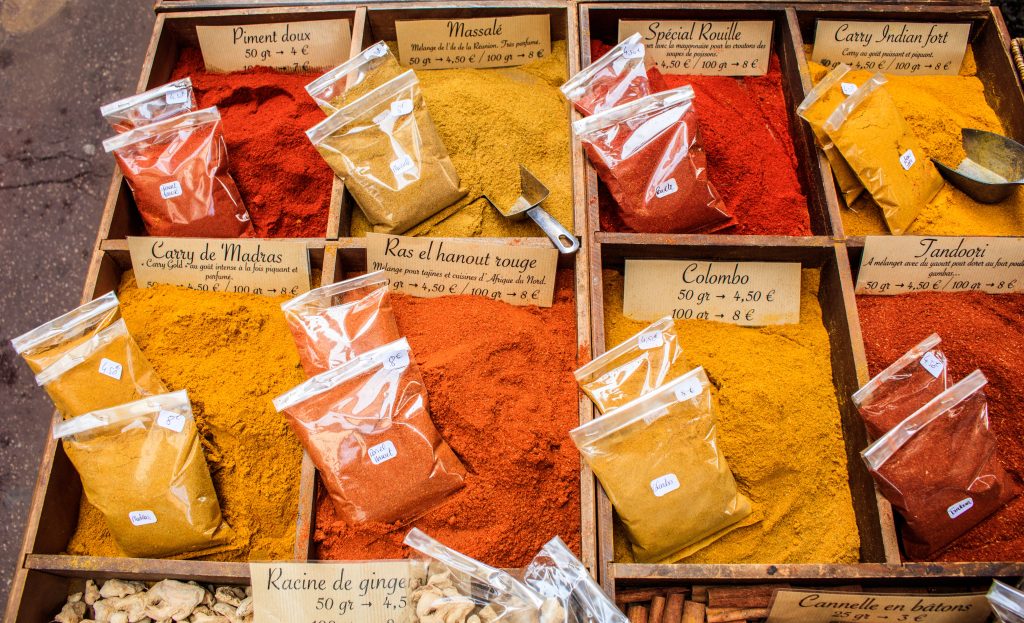Module 05: Bon appétit!
Troisième partie: L’art de la table ! Explication de grammaire
In this section:
-
-ir verbs (regular) present tense
-
boire, croire, voir
-
interrogative words: où, quand, comment…
-ir verbs (regular) present tense

Verbs with infinitives ending in -ir form a second group of regular verbs in French, often called ‘second conjugation’ verbs. To conjugate these verbs, drop the -ir from the infinitive and add the second conjugation present tense endings: -is, -is, -it, -issons, -issez, -issent. The singular and plural forms of the third person are clearly distinguishable (finit vs.finissent). Listen to the difference.
|
||||||||||
Here is a list of other common -ir verbs:
| choisir, to choose | voir, to see | réfléchir, to think, reflect | ||
| établir, to establish | savoir, to know | réunir, to get together, assemble | ||
| grandir, to grow (up) | obéir (à quelqu’un), to obey (someone) | réussir (à), to succeed (at) | ||
| grossir, to gain weight | réagir, to react | vieillir, to grow old |
Not all verbs ending in –ir follow this pattern, however. Irregular –ir verbs include ouvrir, partir, sortir, and dormir.
![]()
Listen carefully to the pronunciation of the verbs in the following dialogue. In particular, note the difference in the pronunciation of one s (pronounced as /z/) and two ss (pronounced as /s/) in the verb ‘choisir.’![]()
 boire, croire, voir
boire, croire, voir

The irregular verbs boire, croire, and voir have similar conjugations. Listen carefully to their forms in the present tense.
| boire ‘to drink’ | |
| je bois | nous buvons |
| tu bois | vous buvez |
| il/elle/iel/on boit | ils/elles/iels boivent |
| past participle : bu | |
| croire ‘to believe’ | |
| je crois | nous croyons |
| tu crois | vous croyez |
| il/elle/iel/on croit | ils/elles/iels croient |
| past participle : cru | |
| voir ‘to see’ | |
| je vois | nous voyons |
| tu vois | vous voyez |
| il/elle/iel/on voit | ils/elles/iels voient |
| past participle : vu | |
interrogative words: où, quand, comment…

Où (where), quand (when), comment (how), pourquoi (why), combien (how much), combien de (how many) may be used to ask questions with subject/verb inversion or with est-ce que. Note that the question word goes before est-ce que.
Read the following dialogue to see question words in context.
| A woman is asking a friend about the background of one of their mutual friends, but he has trouble hearing. He often asks her to repeat the questions. Observe how the question formation differs. | ||
| Où étudie-t-il ? | Where does he go to school? | |
| Comment ? | Pardon? | |
| Où est-ce qu’il étudie ? | Where does he go to school? | |
| À la Sorbonne. | At the Sorbonne. | |
| Quand commence-t-il ses cours ? | When do his classes start? | |
| Comment? | Pardon? | |
| Quand est-ce qu’il commence ses cours ? | When does he start his classes? | |
| Il commence ses cours en septembre. | He begins his classes in September. | |
| Comment se rend-il à l’université ? | How does he get to university? | |
| Qu’est-ce que tu as dit? | What did you say? | |
| Comment est-ce qu’il se rend à l’université ? | How does he get himself to the university? | |
| Il prend le métro tous les matins! | He takes the metro every morning! | |
| Pourquoi choisit-il cette licence ? | Why did he choose that major? | |
| Comment? | Pardon? | |
| Pourquoi est-ce qu’il choisit cette licence ? | Why did he choose that major? | |
| Il est passionné par les sciences depuis son enfance. | He’s been passionate about science since his childhood. | |
| Combien d’heures étudie-t-il par semaine ? | How many hours does he study every week? | |
| Comment? | Pardon? | |
| Combien d’heures est-ce qu’il étudie par semaine ? | How hours does he study every week? | |
| Il étudie environ 30 heures par semaine. | He studies about 30 hours every week. | |
| Combien de devoirs a-t-il chaque semaine ? | How much weekly homework does he have? | |
| Comment? | Pardon? | |
| Combien de devoirs est-ce qu’il a chaque semaine? | How much homework does he have every week? | |
| Il a généralement trois devoirs à rendre par semaine.
Combien de temps passe-t-il à la bibliothèque? Comment? Combien de temps est-ce qu’il passe à la bibliothèque? Il passe environ deux heures par jour à la bibliothèque pour étudier. Pourquoi ne participe-t-il pas aux soirées étudiantes? Comment? Pourquoi est-ce qu’il ne participe pas aux soirées étudiantes? Il préfère se concentrer sur ses études et ne pas se laisser distraire. |
He generally has three assignments to turn in every week.
How much time does he spend at the library? Pardon? How much time does he spend in the library? He spends about two hours every day in the library to study. Why doesn’t he participate in student parties? Pardon? Why doesn’t he participate in student parties? He prefers to concentrate on his studies and won’t let himself be distracted. |


